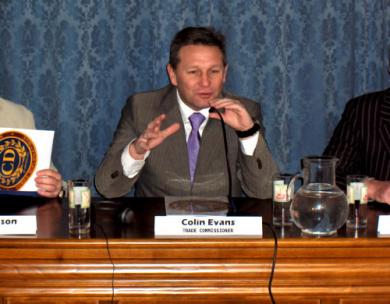“Many developing countries simply cannot afford to maintain the level of diplomatic representation that they actually need, due to financial constraints.” He explains. “It is a very expensive undertaking to recruit, train and maintain diplomatic representatives. When countries with limited budgets need to impose cutbacks, their priorities naturally focus on essential first line services at home. Missions abroad take a back seat. The problem with that, as the old saying goes – out of sight; out of mind. “The Commercial Diplomat is an inexpensive, indeed self-financing, solution”
This can lead to a downward spiral in which under-represented nations miss out on lucrative development and investment opportunities. As a result, they have fewer resources to commit to external representation in future events and negotiations and the situation compounds itself. The Commercial Diplomat is an inexpensive, indeed self-financing, solution.”
Colin is adamant that “cutting back on diplomacy is a false economy.”
A Commercial Diplomat is one who will serve any nation, not just his own. Sometimes this is likened to being the diplomatic equivalent of a ‘Mercenary’ and Colin, widely perceived as the best example in the world of the profession, concedes that some parallels do exist. “I think that it is a little melodramatic to use the word ‘Mercenary’, although the analogy is not without merit.” He allows. I prefer to liken the services of a Commercial Diplomat to that of a retained fireman, an agency nurse or a specialist consultant. A trained expert brought in to handle a problem or provide a service and then move on once the situation is resolved. However, since Commercial Diplomats are professionals paid on results as freelancers, then yes, I would describe them as mercenary, but with a lower case ‘m’.” He goes on to explain, “A Commercial Diplomat typically serves as a Trade Envoy, Delegate or Advisor assigned to conclude a given negotiation – although longer term appointments such as Trade Commissioner are becoming popular as are permanent positions representing governments at Inter-Governmental Organisations.” Commercial Diplomats help countries in obtaining grants and subsidies and assist in negotiating improved terms and conditions or special considerations in international agreements. They come from a variety of backgrounds in both the Public and Private Sector. Some have been Diplomats or Government officers for their own Countries while some come from careers in industry or finance. Colin was formerly a Royal Marines Officer in Britain. He is a graduate of the Professional Studies Course at BRNC Dartmouth where he read Strategic Studies, International Studies, Military Science and Military History. He also holds a Licentiateship and Graduateship from the prestigious City and Guilds of London Institute. His native language is English and he speaks fluent Portuguese which he studied at the University of Coimbra.
“Romanian Economy has vastly expanded over the last decade”
“I particularly enjoy my visits to Bucharest,” he remarks, “partly because the Portuguese and Romanian languages share common Latin roots and many of the words are quite similar. Also, the Romanian Economy has vastly expanded over the last decade, providing excellent opportunities for those I represent. In a nutshell, I have been invited here for two days to promote investment in Romania and Romanian investment abroad.”


